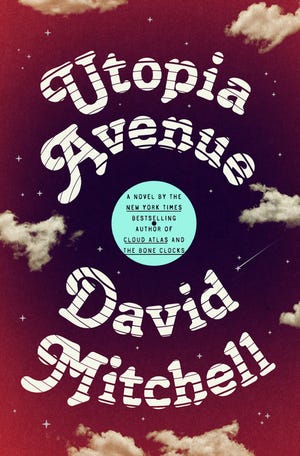Halfway through David Mitchell’s eighth novel, “Utopia Avenue” (Random House, 592 pp., ★★★★ out of four), which follows the adventures of an emerging ‘60s British rock band, one bloke pokes the band’s bummed-out drummer Griff: “Stardom’s getting stressful, is it?”
Seems so. A few pages later, Griff, recovering from a fatal automobile accident, is contemplating quitting the band — just as it’s going big time.
And so it goes, one captivating page after another, two steps forward and one backward, in this deep and textured classic-rock tale written by the imaginative (he has been called a “post-modern visionary”), best-selling English author whose acclaimed novels include the Booker Prize-shortlisted “Cloud Atlas” and “number9dream.”
5 books not to miss:Colin Jost’s ‘Very Punchable Face,’ David Mitchell’s ‘Utopia Avenue’
This novel is more grounded than Mitchell’s most fantastical work: The fictional band Utopia Avenue gets its shaky start in London’s rough-and-rowdy club circuit just as rock music is exploding with originality and creativity.
It’s 1967. The Beatles are the British gold standard and soon will release the counterculture-defining “Sgt. Pepper’s Lonely Hearts Club Band.” The Rolling Stones are embracing bad-boy fame. Across the pond, the Summer of Love is breaking out. And bands like Utopia Avenue are vying to score record deals and become the Next New Thing.

Upstart manager Levon Frankland scours Brit clubs for talent and pulls together the makings of a folksy-bluesy-psychedelic supergroup. Dean Moss, a down-in-luck bass player and songwriter, escaped an impoverished, abusive childhood playing the blues. Singer-keyboardist Elf Holloway’s songwriting fuels the group though her intimacies, sparking infighting and soul searching. Affable, tortured-artist Jasper de Zoet is the lead guitarist whose riffs blow other musicians’ minds. Yorkshire jazz drummer Griff Griffin steadies the band.
From ’67 Soho to ’68 San Francisco, this epic plot spans the band’s triumphs, travails and demise. It’s an anticipated journey, for sure, with full doses of sex, drugs and rock ‘n’ roll. But Mitchell marvelously brings it all to life by focusing his most engaging storytelling on each band member’s own evolution, along with some experimental narrative and exceptional in-concert scenes. Each song-titled chapter continues the personal trajectory of one band member; song lyrics provide further insight.

Adding to the magic is a prodigious supporting cast of real-life rock stars. Cameos from (then still young) David Bowie, Brian Jones, John Lennon, Janis Joplin and more make for addictive reading. Mitchell gives some of them voices: Gene Clark, who quit The Byrds, chats with Jaspar about fame and regrets; Jimi Hendrix asks Griff about recording-studio technicalities; at New York’s Chelsea Hotel, Leonard Cohen asks Elf, “So are you a new inmate at the asylum…?” In the Haight, Jerry Garcia, Dean and Jaspar talk good times and bad.
For readers too young (like the author himself) to know firsthand, and for those old enough to remember or forget, Mitchell masterfully captures the spirit of the times and the tenor of its music. “Utopia Avenue” is a fun and fulfilling read — a 592-page rock ‘n’ roll road trip whose characters and narrative become the song that gets stuck in your head.
